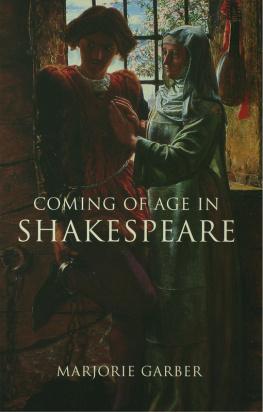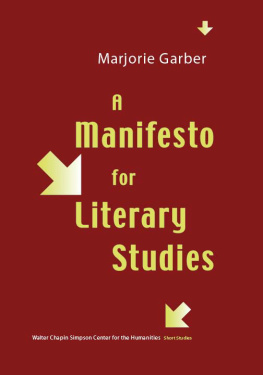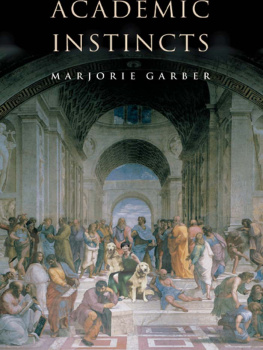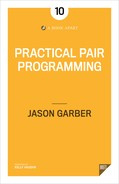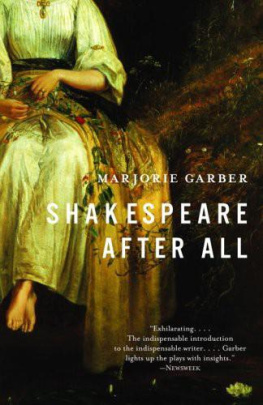Garber Marjorie - Coming of Age in Shakespeare
Here you can read online Garber Marjorie - Coming of Age in Shakespeare full text of the book (entire story) in english for free. Download pdf and epub, get meaning, cover and reviews about this ebook. City: London;New York;N.Y, year: 1997, publisher: Routledge, genre: Romance novel. Description of the work, (preface) as well as reviews are available. Best literature library LitArk.com created for fans of good reading and offers a wide selection of genres:
Romance novel
Science fiction
Adventure
Detective
Science
History
Home and family
Prose
Art
Politics
Computer
Non-fiction
Religion
Business
Children
Humor
Choose a favorite category and find really read worthwhile books. Enjoy immersion in the world of imagination, feel the emotions of the characters or learn something new for yourself, make an fascinating discovery.
- Book:Coming of Age in Shakespeare
- Author:
- Publisher:Routledge
- Genre:
- Year:1997
- City:London;New York;N.Y
- Rating:3 / 5
- Favourites:Add to favourites
- Your mark:
- 60
- 1
- 2
- 3
- 4
- 5
Coming of Age in Shakespeare: summary, description and annotation
We offer to read an annotation, description, summary or preface (depends on what the author of the book "Coming of Age in Shakespeare" wrote himself). If you haven't found the necessary information about the book — write in the comments, we will try to find it.
Coming of Age in Shakespeare — read online for free the complete book (whole text) full work
Below is the text of the book, divided by pages. System saving the place of the last page read, allows you to conveniently read the book "Coming of Age in Shakespeare" online for free, without having to search again every time where you left off. Put a bookmark, and you can go to the page where you finished reading at any time.
Font size:
Interval:
Bookmark:
COMING OF AGE IN SHAKESPEARE
COMING OF AGE IN SHAKESPEARE
Marjorie Garber
ROUTLEDGE
New York and London
To G. Evelyn and Margaret Hutchinson
First paperback edition published in 1997 by
Routledge
29 West 35th Street
New York, NY 10001
First paperback edition published in Great Britain in 1997 by
Routledge
11 New Fetter Lane
London EC4P4EE
Copyright 1981 by Marjorie Garber
First hardcover edition published in 1981 by Methuen
All rights reserved. No part of this book may be reprinted or reproduced or utilized in any form or by any electronic, mechanical, or other means, now known or hereafter invented, including photocopying and recording, or in any information storage or retrieval system without permission in writing from the publishers.
Library of Congress Cataloging-in-Publication Data
Garber, Marjorie B.
Coming of age in Shakespeare / Marjorie Garber.
p. cm.
Originally published: London; New York: Methuen, 1981
Includes bibliographical references and index.
ISBN 0-415-91908-8 (pb: alk. paper)
1. Shakespeare, Wiliam, 15641616Characters. 2. Shakespeare, William, 15641616- KnowledgeManners and customs. 3. Shakespeare, William, 15641616Knowledge Psychology. 4. Rites and ceremonies in literature. 6. Life cycle, Human, in literature.
I. Title.
PR2989.G3 1997 | 96-51672 |
822.33-dc21 | CIP |
Preface

In one of those curious coincidences that seem to illumine our lives, I found myself on the morning of 15 November 1978, having completed at last a draft of this book, listening to a radio report of the death of Margaret Mead. I was not only saddened but profoundly disturbed. For as long as I have had this project in mind which is almost as long as I have been talking to students about Shakespeare I have intended to give it the title it bears, a title frankly borrowed, in great admiration, from Meads first major anthropological work. I began my lecture that morning a lecture rather appropriately concerned with the nature of love in As You Like It by announcing the news of Meads death to the class. When they seemed indifferent I was freshly disturbed. Had they not been listening to me all term? How could they not see as I tried to explain to them how much my approach to Shakespeare resembled, and was indebted to, Meads approach to the nature of primitive societies?
Of course, I expected too much. My students minds were full of other important matters the weekend impended, and so did the paper deadline. Many had doubtless not yet read As You Like It perhaps some had never heard of Margaret Mead. Few recognized that the study of Elizabethan culture and language was at all relevant to our own. But it is nonetheless in the spirit of Meads inquiry into the cultures of other peoples, and in particular the process of maturation, that this book was written and will, I hope, be read. I should like therefore to quote the final paragraph of her introduction to Coming of Age in Samoa as a brief preface to my own argument substituting only the name of the civilization I propose to explore for that which she has so vividly documented, and noting that similarities, as well as contrasts, are frequently to be found between the practices and beliefs of the two societies.
Because of the particular problem which we set out to answer, this tale of another way of life is mainly concerned with education, with the process by which the baby, arrived cultureless upon the human scene, becomes a full-fledged adult member of his or her society. The strongest light will fall upon the ways in which [Shakespearean] education, in its broadest sense, differs from our own. And from this contrast we may be able to turn, made newly and vividly self-conscious and self-critical, to judge anew and perhaps fashion differently the education we give our children.
Acknowledgments
This study could not itself have come of age without the generous support of many persons and institutions. A fellowship from the American Council of Learned Societies permitted me to complete the first draft; a grant from the A. Whitney Griswold Fund and a semester of leave from my teaching responsibilities at Yale University were likewise instrumental in preparing this book for publication. The staff and services of the Beineke Rare Book and Manuscript Library and the Sterling Memorial Library, both at Yale, provided valuable assistance, as at a later date did the librarian and staff of the Haverford College Library.
Among the many people who gave generously of their encouragement and advice, my special thanks go to Rhoda Garber, whose scrupulous stylistic criticisms proved again and again that reason and love can keep company together nowadays, and to Charles Long, whose literary acumen, judgment and patience have contributed much to what may be useful in these pages. Margaret Ferguson, Penelope Laurans and Barbara Packer also offered aid and comfort at crucial times; to all these friends and colleagues I stand indebted, over and above, / In love and service.
I owe as well a continuing debt to my mentors in the field of Shakespeare and Renaissance literature: Alvin Kernan, Maynard Mack, Louis Martz, Susan Snyder and Derek Traversi. Their examples as great teacher-scholars and their humanistic commitment to literature have been of the highest importance in shaping my own sense of vocation and craft. Finally, I should like to thank those many brilliant and inventive younger scholars who have served as my teaching fellows in Shakespeare courses over the past several years. To them, and to the students whom we taught together, I will always be particularly grateful.
Note: were published in Renaissance Drama, IX. I am indebted to the original publishers for permission to reprint this material.
References throughout the book are to the Signet Classic Shakespeare, general editor Sylvan Barnet (New York: Harcourt Brace Jovanovich, 1972).
Introduction
Thy Passages of Life

Jaques celebrated observations on the seven ages of man in As You Like It (II. vii. 13865) reflect a philosophical and iconographie tradition that had its roots in antiquity and was still flourishing in Shakespeares time. The true number of the ages was in dispute, since learned authorities had espoused a number of figures. Aristotle, for example, divided mans life span into three, Pythagoras, Horace and Ovid four, Marcus Varro five, Avicenna and St Augustine six, and Ptolemy and Hippocrates seven; virtually no number from three to twelve was without its proponents. Seven, the magic number associated not only with the ages but also with the planets, the liberal arts, the virtues and the deadly sins, was a popular choice, and Jaques seven ages have a certain pedantic quality not unsuited to his temperament. But what is more interesting from our point of view than the number of ages he describes is the way he elects to describe them.
The infant mewls and pukes in his nurses arms, the boy creeps reluctantly to school, the lover (like Orlando) pens bad poems to his mistresss eyebrow. All these are what we might call typical activities for the ages they characterize, of the same genre as those pictorial representations of boys spinning tops, young men hawking, and old men playing backgammon which were frequently to be seen in frescoes, stained-glass windows, and engravings. The soldier, justice and pantaloon, however, are not really engaged in actions at all; instead they are described in terms of their physical appearance, and especially of their language. The soldier is bearded and full of strange oaths (149), the plump justice speaks in wise saws and modern instances (155), the pantaloon, dwarfed by his clothing, finds his big manly voice / Turning again toward childish treble (1601). A glance back at the earlier ages will reveal that this characterization in terms of utterance is a constant element throughout the passage: the mewling infant, the whining schoolboy and the sighing lover will speak, and illustrate their stages of life as they do so. Jaques set piece, in other words, is not only a conventional listing of types and vignettes, but also a unified portrait of human development, taking speech as a common characteristic from childhood to senility. When we look more closely at the tradition of the ages of man, the presence of such a pattern appears increasingly significant.
Next pageFont size:
Interval:
Bookmark:
Similar books «Coming of Age in Shakespeare»
Look at similar books to Coming of Age in Shakespeare. We have selected literature similar in name and meaning in the hope of providing readers with more options to find new, interesting, not yet read works.
Discussion, reviews of the book Coming of Age in Shakespeare and just readers' own opinions. Leave your comments, write what you think about the work, its meaning or the main characters. Specify what exactly you liked and what you didn't like, and why you think so.

